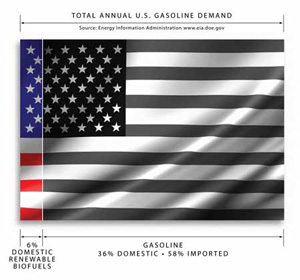 The world’s investment in clean energies – solar, wind and biofuels – jumped an amazing 60 percent from 2006 to 2007… thanks to rising oil prices and changing climate rules.
The world’s investment in clean energies – solar, wind and biofuels – jumped an amazing 60 percent from 2006 to 2007… thanks to rising oil prices and changing climate rules.
This story from Bloomberg.com says the information came from a United Nations Environment Program report:
Wind power attracted the most financing at $50 billion, according to a report today from the Nairobi-based UNEP. Overall, investment in clean-energy and energy-efficiency industries rose 60 percent from 2006.
Carbon dioxide, the byproduct of burning coal, oil and natural gas, is the main pollutant blamed for global warming. Fossil-fuel burning power plants are the world’s biggest source of CO2, according to the Paris-based International Energy Agency.
“We have a significant economic signal here that goes well beyond what even 10 years ago some of the mainstream energy think tanks or international finance institutions thought would happen,” Achim Steiner, the director general of UNEP, said on a conference call. “It reflects a clear understanding in the marketplace that environmental change scenarios are indeed driving public policy.”
Solar power attracted $28.6 billion in new capital in 2007, and the industry has more than tripled each year, on average, since 2004, according to the UNEP report. Investment in energy efficiency reached a record $1.8 billion, a 78 percent increase from 2006.


 Baker became so frustrated about having to constantly defend biodiesel to people who were being misled by incorrect information that he decided to do something about it on a larger level. A few months ago, he began writing statements to potential clients and other interested parties setting the facts straight about biodiesel. Now, he’s heading a national “grassroots” movement for others to do the same. “I like to call it a ‘push back’,” Baker said.
Baker became so frustrated about having to constantly defend biodiesel to people who were being misled by incorrect information that he decided to do something about it on a larger level. A few months ago, he began writing statements to potential clients and other interested parties setting the facts straight about biodiesel. Now, he’s heading a national “grassroots” movement for others to do the same. “I like to call it a ‘push back’,” Baker said.
 Currently, America’s domestic gasoline and ethanol production combined is enough to supply the country’s gasoline needs for 149 days. But through the increased use of biofuels and simple conservation strategies, America could extend its supply by another 27 days – or theoretically until July 4 – before needing to rely on imported oil.
Currently, America’s domestic gasoline and ethanol production combined is enough to supply the country’s gasoline needs for 149 days. But through the increased use of biofuels and simple conservation strategies, America could extend its supply by another 27 days – or theoretically until July 4 – before needing to rely on imported oil.  An
An  According to the article, Pilgrim gave $100,000 to the Republican Governors Association chaired by Perry shortly after that meeting.
According to the article, Pilgrim gave $100,000 to the Republican Governors Association chaired by Perry shortly after that meeting.  Researchers at Rice University are finding more uses for the glut of glycerin brought about by the rise in popularity of biodiesel.
Researchers at Rice University are finding more uses for the glut of glycerin brought about by the rise in popularity of biodiesel.  Regulators have given Iowa-based Renewable Energy Group (REG) the green light for finalizing its buy of a U.S. Biodiesel plant in Houston, Texas.
Regulators have given Iowa-based Renewable Energy Group (REG) the green light for finalizing its buy of a U.S. Biodiesel plant in Houston, Texas.
 Greg Anderson, a family farmer who grows soybeans near Newman Grove, Nebraska (and serves as an ex-officio member of the United Soybean Board Executive Committee) makes some pretty strong arguments that there is not a great food shortage brought on by the rise in popularity of biodiesel:
Greg Anderson, a family farmer who grows soybeans near Newman Grove, Nebraska (and serves as an ex-officio member of the United Soybean Board Executive Committee) makes some pretty strong arguments that there is not a great food shortage brought on by the rise in popularity of biodiesel: City vehicles in Jacksonville, Florida’s will be running more and more on biodiesel… and the green fuel will help clean up the city’s waste.
City vehicles in Jacksonville, Florida’s will be running more and more on biodiesel… and the green fuel will help clean up the city’s waste.